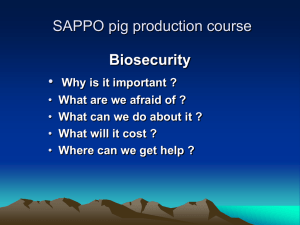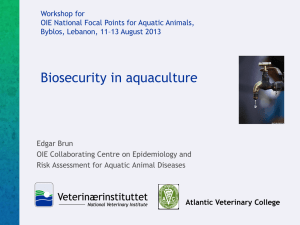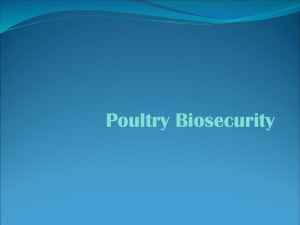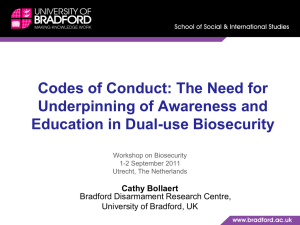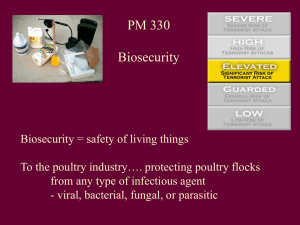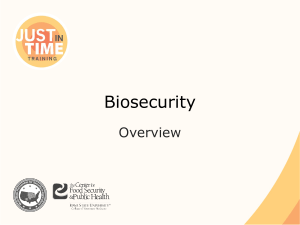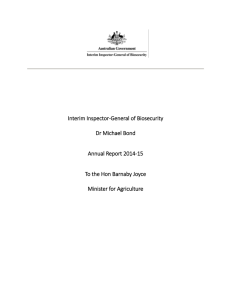8.4 Security - Department of Agriculture
advertisement
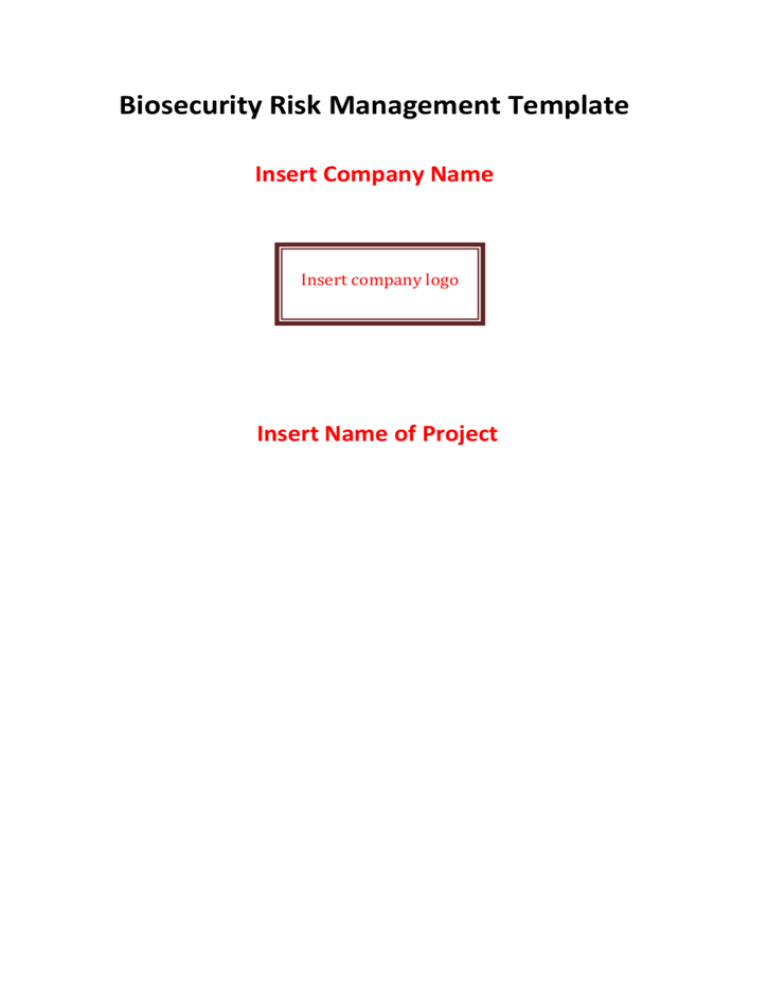
Biosecurity Risk Management Template Insert Company Name Insert company logo Insert Name of Project Biosecurity Risk Management Template Document Management Document revision history Revision Date No. Change By Amendment Project Signoff Distribution list When this document is updated, the following people must receive a copy of the updated version: Name Version: 1 July 2015 Position/title Page 2 Biosecurity Risk Management Template TABLE OF CONTENTS 1. Project overview ........................................................................................................... 4 2. Purpose .......................................................................................................................... 4 3. Scope .............................................................................................................................. 4 4. Management responsibilities ...................................................................................... 4 5. Definitions ...................................................................................................................... 4 6. Reference documents .................................................................................................. 5 7. Cargo types/construction ............................................................................................ 5 8. Site/premise details ...................................................................................................... 5 9. Operational procedures ............................................................................................... 5 10. Training ........................................................................................................................ 7 11. Auditing ........................................................................................................................ 7 12. Reporting and records/documentation ................................................................... 7 Version: 1 July 2015 Page 3 Biosecurity Risk Management Template 1. Project Overview Provide a general overview of the project including details of: project proponent company managing project project operational location/s proposed timeframe of project. 2. Purpose Protecting Australia’s biosecurity is a responsibility shared by government, industry and the community. Biosecurity risk management practices implemented by industry can assist in maintaining Australia’s pest and disease biosecurity status and significantly reduce contamination that leads to schedule slippage and increased project costs. Supplement the above text by including a statement attesting to the project’s commitment to meet Australia’s biosecurity regulations. 3. Scope The scope of this document involves the proponent complying with Australia’s biosecurity requirements by developing and implementing processes and procedures to mitigate biosecurity risks throughout its entire supply chain. This applies to the importation of new break bulk goods and equipment, including accommodation modules and large complex equipment into Australia. Supplement the above statement to incorporate a brief description of details of the project’s operations as follows: locations - (e.g. fabrication yards, export ports, landing ports and staging/storage of equipment) imports - countries of origin and types of cargo (e.g. pre-assembled module, pipes and tanks) activities - (e.g. pipe laying on seabed, discharging jetty construction materials) transport methods equipment. 4. Management Responsibilities Outline the roles and responsibilities of key project personnel responsible for the following related activities: ensuring that this document is current and correctly applied throughout the entire supply chain delivery of biosecurity awareness information and material for project personnel (e.g. induction training, toolbox and pre-start meetings) develop a communications plan to define procedures for recording and reporting biosecurity related issues. 5. Definitions Detail terms used in this template. Version: 1 July 2015 Page 4 Biosecurity Risk Management Template 6. Reference Documents Provide a list of documents to be read in conjunction with this document (e.g. Port Report, Transport Plan, Quarantine Approved Premise and Certificate of Approval documentation). 7. Cargo Types/Construction Provide a description of: cargo including size and complexity (e.g. schematics, images) construction processes (if applicable) biosecurity risks associated with cargo (e.g. potential for water to pool, proximity to vegetation). 8. Site/Premise details 8.1 Site plan Include a site plan of each location (e.g. fabrication yards, lay down areas, loading areas, storage facilities, wharfs). If the loading port is a separate location, then a Port Report should be attached. 8.2 Site description For each site include a description (and images if applicable) of the following: infrastructure (e.g. impervious hardstand areas, drainage, storage areas, covered areas likelihood of flood, storm surge proximity to other parts of import pathway (e.g. wharves, consolidation sites) and surrounding areas (e.g. adjacent land usage) sea-based discharge points (including co-ordinates) 8.3 Site management and inspection regimes Describe the site management and inspection regimes that have been implemented to ensure that biosecurity integrity is maintained e.g. food to be consumed in crib rooms only: hygiene and housekeeping procedures applied weed control programs pest control programs. 8.4 Security Describe the procedures in place to prevent unauthorised access that may compromise the integrity of cargo at facilities: site security e.g. fencing 9. Operational Procedures Version: 1 July 2015 Page 5 Biosecurity Risk Management Template In this section detail the procedures that will provide assurance that the biosecurity integrity of cargo is maintained. 9.1 Imported cargo pathway Describe: the imported cargo pathway and how biosecurity risk management processes will be incorporated and managed throughout the entire supply chain including with suppliers, contractors and sub-contractors the types of biosecurity risks present (e.g. animal, plants, food, soil and water) preventative measures in place to reduce the risk of contamination (e.g. salt rings around cargo, covering potential water collection locations, cleaned cargo to be covered and stored off the ground on a clean and hard surface, transport route management) supplier/contractor compliance with biosecurity management requirements type of manufacture/construction type of consolidation/storage transport plans loading and vessel cleanliness management of biosecurity risks which are detected (e.g. during manufacture, during the voyage etc) preventing cross contamination (e.g. containerisation, tarping, chemical treatments type of packaging, dunnage used) contingency plans (e.g. cyclones, vessel redirections, contamination) identification and traceability of goods unloading procedures. 9.2 Inspections Describe inspection procedures: procedure statements/work instructions records utilised. 9.3 Cleaning /treatment Describe pest control, cleaning and treatment processes, including: details of third party treatment providers pest control methods (e.g. vermin control - trapping, baiting, insecticidal fogging) methods of cleaning equipment re-inspection and validating compliance. 9.4 Waste disposal Describe how waste (solids and wastewater) will be segregated, contained and methods of disposal. Biosecurity Risk Material (BRM) collected in Australia must be disposed of utilising a method approved by the department. Version: 1 July 2015 Page 6 Biosecurity Risk Management Template 10. Training Describe the procedures in place to ensure that all project personnel have an understanding of the importance of biosecurity and their role in maintaining biosecurity integrity: who will deliver biosecurity awareness training method of delivery (e.g. inductions, toolbox/start-up meetings) frequency of training on-going initiatives to maintain biosecurity awareness delivery of training to address non-conformities and/or BRM detections. 11. Auditing Describe the processes in place to ensure that biosecurity risk management practices are being complied with and are effective: audit regime and format 12. Reporting and Records/Documentation Outline records that will be maintained, how they will be recorded: incident reports noting response and remedial action when BRM is detected: off-shore detections – contain, treat/clean, maintain records on-shore detections - contain, immediately report to regional office (ph 1800 900 090), treat/clean (as directed) supply chain inspection reports records of disposal of biosecurity waste records of treatments (e.g. fumigation treatment certificates) training records audit outcome records key performance indicators and compliance records processes implemented to mitigate additional and on-going contamination events processes for managing non-conformities and corrective action. Version: 1 July 2015 Page 7


